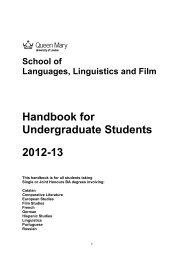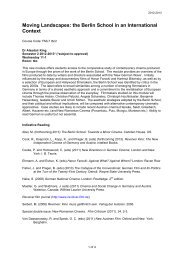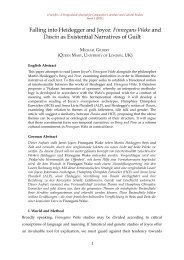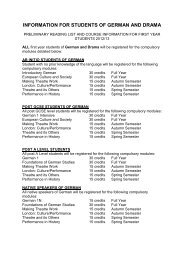You also want an ePaper? Increase the reach of your titles
YUMPU automatically turns print PDFs into web optimized ePapers that Google loves.
eTransfers. A Postgraduate eJournal for Comparative Literature and Cultural Studies<br />
Issue 1 (2011)<br />
propositional knowledge. A proposition is “what is asserted by a sentence which<br />
says that something is the case”. 4 That is, a proposition encodes knowledge about<br />
facts, such as the fact that the earth revolves around the sun. The philosophical dis-<br />
cipline of epistemology concentrates predominantly on propositional knowledge in<br />
the sense of “‘knowing that something or other is the case’ (that-knowledge)”, 5<br />
whereas other types of knowledge, such as ability knowledge, are not the focus of<br />
mainstream epistemology. There are several salient properties of propositional<br />
knowledge. First, propositional knowledge must necessarily be verbalised. Secondly,<br />
it does not depend on the consciousness of a particular knower but can be widely<br />
spread among a population of knowers — propositional knowledge claims general<br />
validity. And thirdly, propositional knowledge can only be about something. There-<br />
fore, it always takes an exterior viewpoint on its object.<br />
The search for generally valid propositional knowledge is also at the heart of any<br />
scientific enterprise, since what the sciences strive for is reliable knowledge about<br />
facts, about things or phenomena that are the case. However, scientific knowledge<br />
has become more and more specialised, a development manifest in the isolation of<br />
smaller and smaller items of knowledge that are the subjects of propositions. This<br />
phenomenon can be framed as the fragmentation of knowledge that follows the di-<br />
viding lines between scientific disciplines. The fragmentation of knowledge is not<br />
limited to different methodologies and research procedures, but is visible in the<br />
whole set-up that is used in order to produce knowledge. As the sociologist Karin<br />
Knorr-Cetina points out in her study Epistemic Cultures:<br />
Magnifying this aspect of science — not its production of knowledge but its epistemic<br />
machinery — reveals the fragmentation of contemporary science; it displays different<br />
architectures of empirical approaches, specific constructions of the referent,<br />
particular ontologies of instruments, and different social machines. 6<br />
4 Duncan Pritchard, What Is this Thing Called Knowledge? (London: Routledge, 2006), 4.<br />
5 Nicholas Rescher, Epistemology. An Introduction to the Theory of Knowledge (Albany: State University<br />
of New York, 2003), xiii–xiv.<br />
6 Karin Knorr-Cetina, Epistemic Cultures. How the Sciences Make Knowledge (Cambridge, Mass.: Harvard<br />
University Press, 1999), 3.<br />
5







